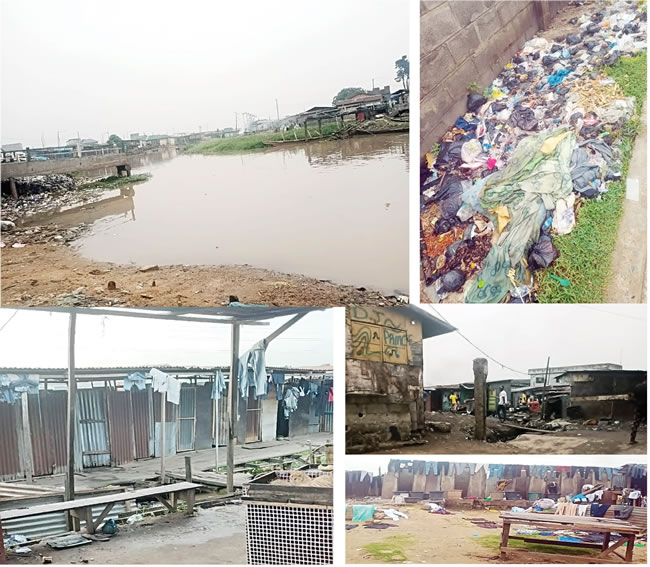Public Toilets Raise Fear Of Fresh Epidemic In Lagos Communities
[ad_1]
FEAR of an imminent major health crisis is spreading in a densely-populated axis of Lagos State which is home to the popular Mile 12 Market, one of the largest markets in the state.
Residents of the affected area, which includes Mile 12, Ibrahim Sanusi Estate and adjoining smaller communities, operating under the aegis of Mile 12 Community are calling on concerned authorities for immediate help.
The problem confronting members of the community is alleged illegal operation of public toilets in their respective neighbourhoods in a way that constitutes health hazards to thousands of residents of the state.
The community members are particularly worried after having just witnessed a cholera outbreak, another epidemic is staring them in the face.
In a message to Saturday Tribune, the residents alleged that the unwholesome practice of discharging feaces straight into their waterways has gone on for almost a decade.
The statement reads: “We, as concerned members of Mile 12 Community, are disturbed by the activities going on in the area as regards the discharge of feaces into our waterways by some individuals who are hell-bent on making money at the expense of our lives and wellbeing.
“The issue has to do with the activities of some public toilet owners. Some are built and others are of wooden structures constructed at the bank of the river in the area. The ones built rarely have a septic tank but rather channel pipes into the river to discharge feaces into the river that some people use for fishing and washing, thus contaminating the water.
“As for the ones made of wood, they are constructed on the river bank and feaces are being dropped directly into river as well.
“It is worrisome, unhygienic and a source of concern to any right-thinking individual. The community can’t be held to ransom by a few individuals. There are about 15 of the said public toilets within the river bank and only one has septic tank but the rest either channel pipe into the river to discharge the feaces or the feaces get dropped directly into the river.
“Just a few weeks ago, there was an outbreak of cholera and it had to do with contaminated water which the public toilet played a major role in. If the activities go unabated, unchecked and not stopped, there may be a disease outbreak in the offing.
“I hope and pray that our complaint will be looked into and necessary actions taken to put a stop to the inhumane activities. The river is called Ogun River but we call it Maidan River in Mile 12. It is the only river there. It comes from Kara in Ogun State down to Mile 12, Owode and Ajegunle. There are about 15 of the said public toilet but only one has a septic tank.
“At Adeyeye Street of Mile 12, there are seven public toilets. Three of them are built and four are of wooden structures constructed at the river bank. People pay the sum of N100 to use the structure to defecate directly into the river. As for the ones built, only one has septic tank and the remaining two use channeled pipes to discharge feaces into the river.
“There are other public toilets at Ibrahim Sanusi Estate as well within Mile 12, also of wooden structure. They have taken it to be a line of business and it has been going on for over 10 years. The sad part of it is that some people fish from the river and do washing there.”
Saturday Tribune’s visit
Mile 12, in Kosofe Local Government Area, is made popular by the market where moderate prices of commodities are believed to attract shoppers from even outside the state.
While the market may be good news for shoppers, it is another story for the neighbourhoods in the community.
A trip by Saturday Tribune to Mile 12, on the way to Agiliti, an adjoining community in the area, revealed a looming outbreak of disease following the flagrant discharge of faeces and channeling of septic tanks into the popular Maidan River in the locality.
A stop-over at the popular Federal Bus Stop and a brief walk through Ibrahim Sanusi Street to Adeleye Street by Saturday Tribune reporter revealed the illegal operation of what is referred to as public toilets on the bank of the river.
At Adeleye Street in Mile 12, seven public toilets were seen, three of which are built and four made of wooden structures constructed at the river bank, confirming the claim of the protesting residents. The neighbourhood is a clear case of poor sanitation.
The entire streets in the slum community were populated by the Hausa/Fulani who use the makeshift toilets daily.
Some of the toilets were built with bricks without a roof while others were built with wooden structures on the river where people pay between N50 and N100 to use the facility. The entire environment was dirty while offensive odour from the river rent the air.
To find out where the septic tanks of the wooden public toilets were located, the reporter approached one of the operators posing as a potential user.
The reporter was asked to pay a N50 fee and was asked to drop his mobile phone and other gadgets on him with the toilet’s attendant, a northerner. To prevent any suspicion, the reporter surrendered his android phone and jotter to the toilet’s attendant before proceeding to the raised wooden platform called public toilet on River Maidan.
Inside the makeshift was a passage that led to some demarcated spaces like cubicles which 12 individuals could use at a time. There was no water closet or tap inside the cubicle as you are directly on top of the river. All one needs to do is to defecate directly into the river. On the wooden platform, one could see how heaps of feaces adorned the river and its bank.
There are other toilets built with bricks on the bank of the river. Some of the managers of the toilets said they were not ready to answer any questions.
Some of the residents said they were afraid that the sanitary situation could lead to a major outbreak of disease not only in the community but in the entire state because some people still conduct fishing activities at the river.
We’ll go after them –CDC chairman
The chairman of the Community Development Committee in Kosofe Local Government Area, Alhaji Kazeem Razaq, denied any knowledge of the public toilet operators dumping faeces in the drainage channels.
He said: “That public toilets operators channel faeces into the drainage system has come to my knowledge for the first thing. If they do that, it is dangerous.
“We will go after them and serve them notice if we found them wanting. We can’t and won’t allow public toilet operators to cause epidemic in the community. We cannot allow that.
“If our efforts are not fruitful, I am assuring you that if they fail to comply with our warnings, we will report them to the Lagos State government for necessary action.”
Commenting on the attitude of residents in the community towards maintaining a clean and healthy environment, he said: “There is nothing we have not done to bring an end to the menace but they have been heedless to our warnings.
“When you go to these people and they promise to desist from such hazardous acts, after a week, they will continue with their old ways and never comply with instructions. There is no sanction the CDC can impose on them and if we threaten to arrest and report them at the police station, the police would tell us there is nothing they can do. So, it is either we live with it or we patiently correct them.
“We have reported them to the health authorities at the local government council but rather than correct their ways and adopt safety measures, they go all out shouting that the council chairman has locked their houses and businesses.
“They promise to desist from polluting the environment with their faeces but they do it again and again.
“Whenever we make a move for corrective measures, they criticise us but we have to be patient with them. However, we cannot fold our arms and watch until epidemic breaks out in our community.
“The government cannot do it alone, we have to complement the efforts of the government and at the same, I am appealing to those residents that are in the habit of dumping faeces in the drainages to stop doing so for the sake of the general wellbeing of the community.”
Residents risk faeco-oral diseases –LASUTH consultant
A consultant public health physician at the Lagos State University Teaching Hospital (LASUTH), Dr Adedayo Aderibigbe, said dropping faeces in water can cause faeco-oral diseases.
Aderibigbe, who described the practice as unhealthy, identified the diseases as typhoid fever, hepatitis A, eye and ear infections and gastroenteritis, among others. He said fishermen and other workers in that environment are likely to consume the water for drinking.
The public health expert added that the situation limits the options of protein for humans in their diet “as we all know many aquatic organisms are rich in protein” he noted.
Aderibigbe said: “The implication for those consuming the water is that it causes many faeco-oral diseases such as typhoid fever, Hepatitis A, eye and ear infections, gastroenteritis, among many others.
“You will be surprised that many of those workers, especially fishermen and other workers in that environment consume the water for drinking.
“Secondly, the abdomen contains coliform bacteria which when passed along with stool inside water, increases the organic content of the water thereby reducing oxygen in the water and this causes many aquatic organisms to die.
“This, overall, limits the options of protein for humans in their diet as we all know many aquatic organisms are rich in protein.”
Researchers at sciencedirect.com equally note that defecation and feces disposal practices can contaminate the soil and water of the community without adequate sanitation facilities, increasing the risk of infection for other individuals.
According to them, sanitation is essential to health, survival, and development, and safe sanitation system is designed and used to separate human excreta from human activity at all stages of the sanitation chain, from safe toilets and containment by means of transport, care and final disposal or final usage.
Without proper sanitation facilities, they argue that waste from infected individuals can contaminate the soil and water of the community, raising the risk of infection for other individuals.
Poor sanitation is associated with disease spread such as cholera, diarrhea, dysentery, Hepatitis A, typhoid, and polio, and exacerbates stunting.
Fear of ethnic clash
Saturday Tribune discovered that many residents in the area are afraid of condemning the situation for fear of attack despite the location of a police post in the area.
Asked how she felt about the water pollution in the environment, a shop owner in the area refused to talk, saying she only minded her business.
Another resident at the other end of the river, who did not want his name in print, said that most of the houses in the community are without toilets and septic tanks due to the terrain, which is water-logged.
This implies that many residents living around the river bank dump faeces in the river.
When contacted, a female staff member of a primary health centre located about 200 meters away from the community, downplayed the whole scenario, saying that sanitary inspection officers usually visit the community to ensure cleanliness.
Govt to take immediate step –Ministry official
Efforts to get the spokesperson of the Ministry of Environment, Mr Adekunle Adesina, to respond to the issue were not successful.
As of press time, he was yet to respond to a message sent to him. Also, he was not available when the reporter visited his office on Friday. He was said to be on an official assignment.
However, an official in the ministry’s sanitation department, who spoke on the condition of anonymity, said the department was aware of the situation in Mile 12 and had served the leadership of the community a letter.
The official said the department also had a meeting with the community leaders early this week and gave the assurance that the government is going to act immediately.
“We are going to have a meeting with them probably next week,” the official said, adding that the government had carried out a lot of advocacy in this regard.
[ad_2]















Post Comment